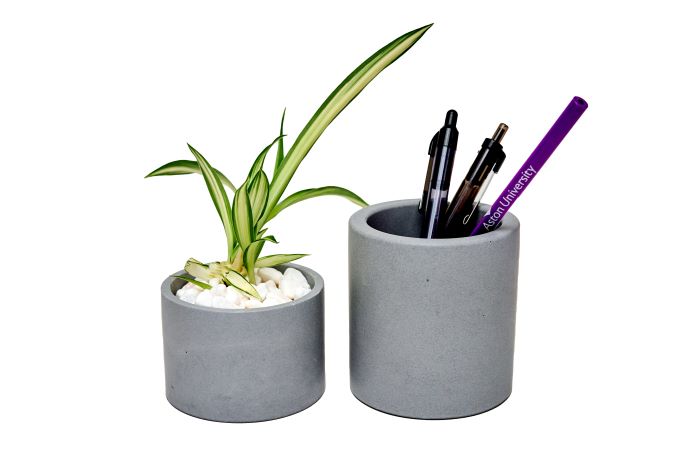
Biochar has been used to make office items for a Birmingham law firm, in a recent project by Aston University researchers.
Mills & Reeve have kitted out their new city centre building at One Centenary Way with the environmentally-friendly products, while working with local suppliers.
A collection of durable plant and pen pots were made for them from material produced at a pyrolysis demonstrator at Cofton horticultural nursery in the south of the city that is run by Aston University’s Energy & Bioproducts Research Institute (EBRI).
With its industrial partners EBRI has developed an innovative technology which thermally converts organic waste into three commercially valuable products, biochar, gas and liquids. The unwanted matter includes fallen and diseased trees, sawdust – and even chicken manure.
Biochar, a sustainable form of charcoal, has significant opportunities for reducing the impact of climate change because it can be used for carbon sequestration – the process of capturing and storing carbon dioxide. When put in the earth, biochar works to improve the soil and enhances plant growth, and also doesn’t decay over a long period of time.
Tim Miller, project lead of the Biochar CleanTech Accelerator at Aston University, said: “Biochar can be used for a number of things, including 3D printing, as a composite material, and as a way to reduce the carbon impact of cement. We’d love to explore all of these opportunities, but we can’t do it alone which is why we’re excited to be working alongside Mills & Reeve as they move to their new, sustainable office. We hope to work with more local companies in the future to take forward serious propositions for the marketplace.”
The University team sifted down the biochar into a fine powder, mixed it with the resin and left to dry in a mould. The collection was designed by Dr. Maria Pimenta-Ocampo, an environmental engineer who is a research associate for the University’s Biochar Cleantech Accelerator project. Her work currently involves evaluating the environmental impact and carbon sequestration potential of pyrolysis products and analysing the use of biochar to lock carbon in soil and also in alternative materials such as composite resins.
Neil Pearson, head of ESG and social value at Mills & Reeve, said: “We’ve teamed up with Aston University because we’re very keen on engaging with local organisations in Birmingham that align with our social and sustainability values. We’re really excited about the work that they’re doing, it’s a real market leader in looking at biochar and commercial ways in which biochar can be used.”







